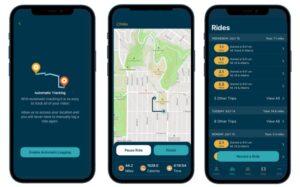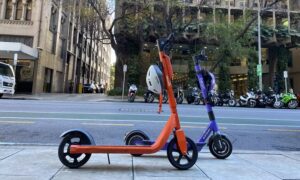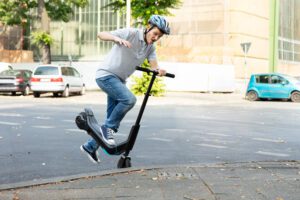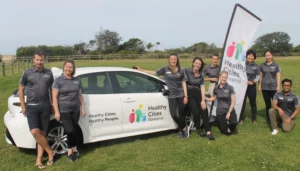Effective engagement with students is central to a successful walk and cycle to school program.
Healthy Cities Illawarra representative Jon Lindley explains how the group’s Safe and Active Roads to School program educated school children on the benefits of walking and cycling to school and about how 30kmh speed limits are used around the world to enable young people to walk or ride safely.
A new app is getting more people on bikes by replicating the success of the Fitbit in motivating people to walk more.
Love to Ride Asia Pacific Regional Manager Christina Sorbello will explain the technology behind the Love to Ride app and many of its initial data and findings.
“Right now, bike riding data is where step counting data was at 12 years ago,” Christina says.
Demand for deliveries of almost everything from ready-to-eat meals to home improvement items is on the rise.
The resulting demand on freight services, especially the ‘last mile’ that brings the service or product directly to customers, adds pressure to cities and neighbourhoods. Relying upon cars, vans and trucks for the last mile risks clogging up local places, adds to emissions and negatively impacts on health and wellbeing.
Sara Stace and Shifani Sood, from consultancy firm WSP Global, will provide case studies from around the world on success stories and ideas that can be applied in cities across Australia to enable an effective shift towards micromobility for the last mile.
Parking has been a thorny issue for e-scooter share services in many countries.
Penelope Bennett, Senior Transport Planner at the City of Adelaide, will share insight to a trial by the SA council to test the effectiveness and desirability of designated scooter parking.
The trial received mixed feedback about designated parking and identified technical and practical issues. The outcomes of a community survey for the trial will help determine if e-scooter designated parking zones (with decals on the footpath) are appropriate infrastructure for ongoing use. It will also highlight benefits and issues with the wider application of designated parking.
UK city Leicester is a shining beacon for active transport, visited by transport officials from throughout Britain and the world to discover the ingredients for its success.
Leicester City Council’s Active Travel Team Leader, Andy Salkeld, has been central to the city’s transformation and will share a 10-year overview of the progress from car dominance and dependency to people-friendly streets.
His insights include the value of strong political leadership and generating a mandate for change that consider the economic, social and environmental benefits of people-friendly strategies.
Maryna Pobudzei, a researcher into micromobility sharing systems, presents the results of a Munich study that identified differences and similarities between e-scooter and bicycle crashes. The 31-month study revealed valuable trends in the types of people involved in scooter and bike crashes, where they are most likely to occur, and how further investigations can improve micromobility safety.
A new safe cycle route algorithm and mobile app, developed in Victoria, is enabling riders to find the safest, easiest or most direct way to get to their destinations.
Intelematics, a technology and mobility solutions enterprise owned by the Royal Automobile Club of Victoria (RACV), developed the algorithm and app in collaboration with the RACV, government transport authorities and mobility member organisations.
Max Wang, the Senior Product Manager at Intelematics, will discuss the technology, how it’s supporting new and aspiring riders to feel more confident to travel by bike and what can be done to further remove barriers to micromobility.
Healthy Cities Illawarra CEO Kelly Andrews will share her team’s community-based active transport project to break the deadlock between the need to get children more active and parents’ fears about road safety.
Data from the Illawarra region shows children want to ride or walk to school. However, parents are reluctant because of a ‘lack of safe pedestrian crossings, high vehicle speeds and poor separated bike or walking paths’.
Reliable and secure parking options will be central to unlocking the full potential of micromobility.
Parking systems must be reimagined for the characteristics of micromobility, so modern urban transport systems can be easily accessible, rapidly deployed, and highly responsive to demand.
CargoCraft’s Business Development Manager, Al Reid, will outline the company’s docking system
Injury prevention, legal and design solutions must come together to tackle barriers to cycling, if communities are going to achieve their objectives to get more people on bikes, according to industrial designer and leading Melbourne academic Dr Robbie Napper.
- « Previous
- 1
- 2
- 3
- 4
- Next »










